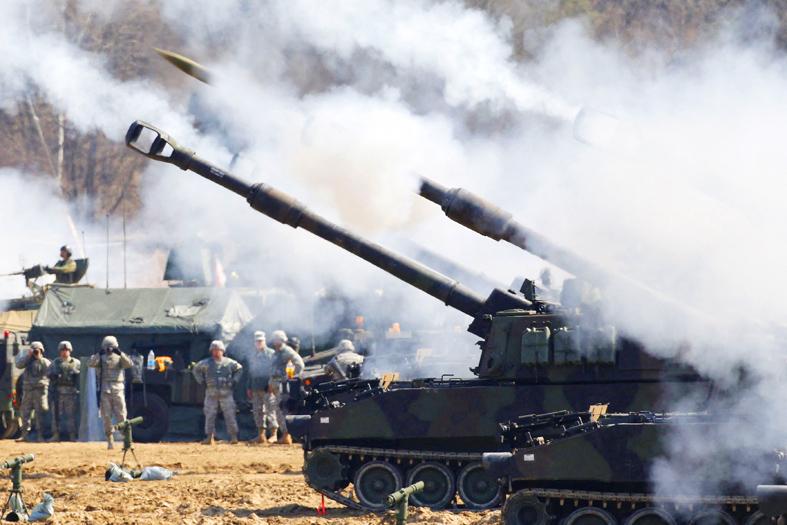The Presidential Office yesterday thanked Washington after the US Department of State approved the sale of 40 Paladin M109A6 self-propelled howitzers and related equipment to Taiwan, the first such deal since US President Joe Biden took office in January.
With the sale, the US is honoring its commitment to furnish Taiwan with defensive articles under the US’ Taiwan Relations Act and the “six assurances,” Presidential Office spokesperson Xavier Chang (張惇涵) said while expressing the government’s “sincere gratitude” for the deal.
The US Department of Defense’s Defense Security Cooperation Agency said in a statement that it notified Congress on Wednesday of the US$750 million deal.

Photo: AFP
In addition to logistical support, the package includes 40 155mm M109A6 medium self-propelled howitzer systems; 20 M992A2 field artillery ammunition support vehicles; an advanced field artillery tactical data system; five M88A2 Hercules vehicles; five M2 Chrysler mount .50 caliber machine guns; and 1,698 multi-option precision guidance kits, the agency said.
The sale would “contribute to the modernization of the recipient’s self-propelled howitzer fleet, enhancing its ability to meet current and future threats ... while further enhancing interoperability with the United States and other allies,” it said.
The package marks the first US arms sale to Taiwan under the Biden administration, “fully demonstrating the US government’s high regard for Taiwan’s defense capabilities,” Chang said.
Washington’s provision of defensive arms helps boost Taiwan’s self-defense capabilities, thereby improving the nation’s ability and confidence to preserve regional and cross-strait peace, he said.
The Ministry of Foreign Affairs yesterday confirmed receipt of official notice from Washington about the package.
The US has continued its policy of normalizing arms sales to Taiwan in recent years, helping the nation to acquire defensive equipment in a timely manner, the ministry said.
Despite Chinese aggression, Taiwan would continue to improve its defensive capabilities to safeguard the lives and property of Taiwanese, and their democratic way of life, it said.
Through close cooperation with the US, the nation would maintain peace in the Taiwan Strait and keep contributing to the long-term peace, stability and prosperity of the Indo-Pacific region, it said.
The package is likely to be formally confirmed by Congress after a month, the Ministry of National Defense said in a statement, thanking Washington for the agreement that would help “enhance the rapid response and fire support capabilities of our ground forces.”
Separately, the Chinese Ministry of Foreign Affairs said it has lodged stern representations with the US while promising to take appropriate countermeasures.
The agreement interferes in internal Chinese affairs and “sends a wrong message to Taiwan independence secessionist forces” in contravention of international law and norms, it said.
The Chinese ministry also urged Washington to abide by the “one China” principle and the Three Joint Communiques, and to immediately cease all military cooperation with Taiwan to “avoid further damaging China-US relations, and peace and stability in the Taiwan Strait.”

A magnitude 5.6 earthquake struck off the coast of Yilan County at 12:37pm today, with clear shaking felt across much of northern Taiwan. There were no immediate reports of damage. The epicenter of the quake was 16.9km east-southeast of Yilan County Hall offshore at a depth of 66.8km, Central Weather Administration (CWA) data showed. The maximum intensity registered at a 4 in Yilan County’s Nanao Township (南澳) on Taiwan’s seven-tier scale. Other parts of Yilan, as well as certain areas of Hualien County, Taipei, New Taipei City, Taoyuan, Hsinchu County, Taichung and Miaoli County, recorded intensities of 3. Residents of Yilan County and Taipei received

Taiwan has secured another breakthrough in fruit exports, with jujubes, dragon fruit and lychees approved for shipment to the EU, the Ministry of Agriculture said yesterday. The Animal and Plant Health Inspection Agency on Thursday received formal notification of the approval from the EU, the ministry said, adding that the decision was expected to expand Taiwanese fruit producers’ access to high-end European markets. Taiwan exported 126 tonnes of lychees last year, valued at US$1.48 million, with Japan accounting for 102 tonnes. Other export destinations included New Zealand, Hong Kong, the US and Australia, ministry data showed. Jujube exports totaled 103 tonnes, valued at

TRUST: The KMT said it respected the US’ timing and considerations, and hoped it would continue to honor its commitments to helping Taiwan bolster its defenses and deterrence US President Donald Trump is delaying a multibillion-dollar arms sale to Taiwan to ensure his visit to Beijing is successful, a New York Times report said. The weapons sales package has stalled in the US Department of State, the report said, citing US officials it did not identify. The White House has told agencies not to push forward ahead of Trump’s meeting with Chinese President Xi Jinping (習近平), it said. The two last month held a phone call to discuss trade and geopolitical flashpoints ahead of the summit. Xi raised the Taiwan issue and urged the US to handle arms sales to

BIG SPENDERS: Foreign investors bought the most Taiwan equities since 2005, signaling confidence that an AI boom would continue to benefit chipmakers Taiwan Semiconductor Manufacturing Co’s (TSMC, 台積電) market capitalization swelled to US$2 trillion for the first time following a 4.25 percent rally in its American depositary receipts (ADR) overnight, putting the world’s biggest contract chipmaker sixth on the list of the world’s biggest companies by market capitalization, just behind Amazon.com Inc. The site CompaniesMarketcap.com ranked TSMC ahead of Saudi Aramco and Meta Platforms Inc. The Taiwanese company’s ADRs on Tuesday surged to US$385.75 on the New York Stock Exchange, as strong demand for artificial intelligence (AI) applications led to chip supply constraints and boost revenue growth to record-breaking levels. Each TSMC ADR represents